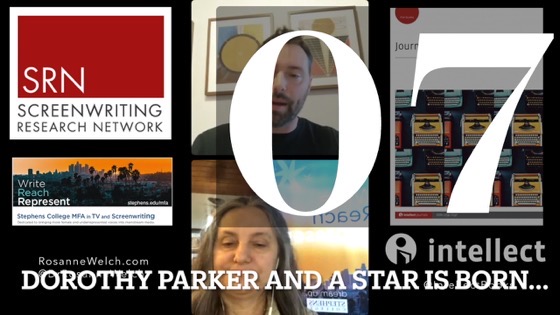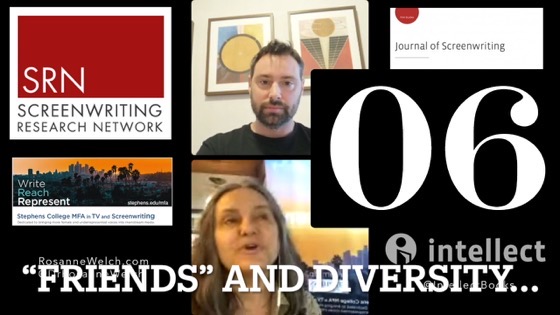Transcript:
Now the special issue we just did, I co-edited with Rose Farrell who’s at Edith Cowan University in Australia, and what I love about – we all come from this group called the Screenwriting Research Network, which meets internationally once a year, although not this year because of COVID. We were supposed to be in Oxford and we didn’t get to go but through that, we were just sitting around having a chat one day with the editor Craig Batty and I teased him because there’s always a special issue. There’s an issue on animation. There’s an issue in children’s films. I said why didn’t we ever do an issue on women and he stopped and he went, you could do it if you want. It’s like more work right but you want to see something done. Sometimes you just have to do it yourself. So then I was very smart because I knew how much work it would be and I called Rose and I said Rose do you want to do this with me and she was like oh what a great idea. So we did internationally this work you know going through zoom and going through our email and whatnot but she was the voice that said not only should this be about women but this should be about international women. We have published much about films in the UK and in the United States. What else can we find? So I’m really proud of the fact that you’ll find articles in there – a female writer from Syria – a female writer from Zimbabwe. We’ve got writers from Israel. We’ve got stories from Brazil. Peru. Argentina.
One of the benefits of attending conferences is that you can meet the editors from the companies that have published some of your books face to face. That happened at the recent SCMS conference where I met Intellect editor James Campbell and he invited me to be a guest on his InstagramLive show.
We chatted about my work with the Stephens College MFA in TV and Screenwriting, and then my work with co-editor Rose Ferrell on the Journal of Screenwriting’s special issue on Women in Screenwriting (Volume 11, Number 3) that came out recently and which featured articles about an international set of female screenwriters from Syria, Argentina, China and Canada (to name a few).
We even had time to nerd out on our own favorite classic films across the eras which brought up fun memories of Angels with Dirty Faces, Back to the Future, Bonnie and Clyde, and of course, all things Star Wars from the original 3 to The Mandalorian. It’s always so fun to talk to fellow cinephiles.

Watch this entire presentation
With Intellect Books Editor James Campbell (@IntellectBooks)
Speaking with Dr. Rosanne Welch, Author, teacher, and television screenwriter. Today we cover everything from women in screenwriting to our favorite Jimmy Cagney movies and Friends.
Podcast: Play in new window | Download
Subscribe: RSS
![09 A Special Issue on Women Screenwriters from In Conversation with Dr. Rosanne Welch and Intellect Books [Video]](https://rosannewelch.com/wp-content/uploads/2022/05/rmw-intellect-09.jpg)

![08 More On Dorothy Parker and A Star Is Born from In Conversation with Dr. Rosanne Welch and Intellect Books [Video]](https://rosannewelch.com/wp-content/uploads/2022/04/rmw-intellect-08.jpg)


![From Women in Early TV for the American Women Writers National Museum [Video]](https://rosannewelch.com/wp-content/uploads/2022/04/rmw-visible-stars-early-tv-19.jpg)

![05 Interesting Women Screenwriters? from In Conversation with Dr. Rosanne Welch and Intellect Books [Video]](https://rosannewelch.com/wp-content/uploads/2022/04/rmw-intellect-05.jpg)
![18 Joanna Lee & Madeline Anderson From Women in Early TV for the American Women Writers National Museum [Video]](https://rosannewelch.com/wp-content/uploads/2022/04/rmw-visible-stars-early-tv-18.jpg)
![04 Who Inspired You? from In Conversation with Dr. Rosanne Welch and Intellect Books [Video]](https://rosannewelch.com/wp-content/uploads/2022/03/rmw-intellect-04.jpg)
![17 Even More On Treva Silverman From Women in Early TV for the American Women Writers National Museum [Video]](https://rosannewelch.com/wp-content/uploads/2022/03/rmw-visible-stars-early-tv-17.jpg)
![03 Unreliable Narrators from In Conversation with Dr. Rosanne Welch and Intellect Books [Video]](https://rosannewelch.com/wp-content/uploads/2022/03/rmw-intellect-03.jpg)